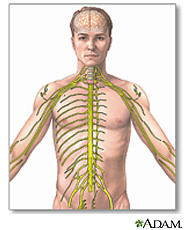Refine by Type
- All Results (1,298)
 Health Topics (13)
Health Topics (13) External Health Links (921)
External Health Links (921) Drugs and Supplements (54)
Drugs and Supplements (54) Medical Encyclopedia (118)
Medical Encyclopedia (118) Videos and Tutorials (101)
Videos and Tutorials (101) News (13)
News (13) MedlinePlus Magazine (10)
MedlinePlus Magazine (10) Other Resources (68)
Other Resources (68) Multiple Languages
Multiple Languages
Refine by Keyword
- remixAll Results (1,298)
- BSc, MD , FRCS (18)
- Diagnosed (12)
- Family (11)
- Injection (9)
- Myelin | Nervous (7)
- American (9)
- Doctor (6)
- Vitamin (6)
- Staff | Cause (5)
- more


